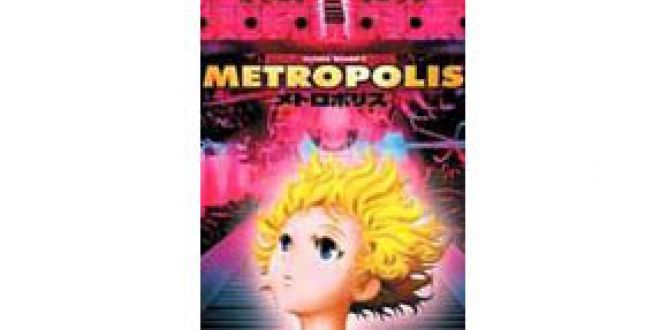Osamu Tezuka’s Metropolis Parent Guide
Parent Movie Review
 OSAMU TEZUKA’S METROPOLIS UNVEILS a well-crafted and meticulously detailed futuristic skyscraper capital based on his successful 1940s Japanese comic. Working with animators, Screenwriter Katsuhiro Otomo and Director Rintaro adapt the comic book adventures and bring it to life on the big screen.
OSAMU TEZUKA’S METROPOLIS UNVEILS a well-crafted and meticulously detailed futuristic skyscraper capital based on his successful 1940s Japanese comic. Working with animators, Screenwriter Katsuhiro Otomo and Director Rintaro adapt the comic book adventures and bring it to life on the big screen.
In the ultramodern city-state, robots live among the humans, taking on various menial tasks. Deep in the belly of the thriving center, they dispose of sewage and help produce power. Above ground, they act as buskers, vendors, and policing assistants in an urban society that is nearing the apex of civilization. But while the city’s president and his agents prepare to celebrate the pinnacle of their achievements, unrest grows among disgruntled anti-robot groups consigned to the social order’s lower levels.
 While tensions rise, detective Shunsaku Ban and his assistant, Kenichi, arrive from Japan in search of Dr. Laughton, an eccentric scientist wanted by police. Helped by a robot, Ban discovers the inventor holed up in an underground laboratory. But mayhem breaks out before he can handcuff the sought after villain and get hold of his newest creation, Tima, a young female superhuman.
While tensions rise, detective Shunsaku Ban and his assistant, Kenichi, arrive from Japan in search of Dr. Laughton, an eccentric scientist wanted by police. Helped by a robot, Ban discovers the inventor holed up in an underground laboratory. But mayhem breaks out before he can handcuff the sought after villain and get hold of his newest creation, Tima, a young female superhuman.
When Ban’s aide goes missing, the visiting investigator begins an all out search of the downtown’s zones and uncovers a plot to topple the government and insert an omnipotent leader over the citizens of Metropolis.
 Although Tezuka, the famed illustrator, is known for his children’s television series Astro Boy and Kimba The White Lion, the themes in Metropolis are decidedly adult. As a select few rise in power, they shovel the unwanted humans out of their way until rebellion threatens universal destruction. Echoing movies like A.I.: Artificial Intelligence, this society’s ills are sharply questioned, but the use of gratuitous shootings by unchecked militants and other violence will make its lessons too unsavory for most families.
Although Tezuka, the famed illustrator, is known for his children’s television series Astro Boy and Kimba The White Lion, the themes in Metropolis are decidedly adult. As a select few rise in power, they shovel the unwanted humans out of their way until rebellion threatens universal destruction. Echoing movies like A.I.: Artificial Intelligence, this society’s ills are sharply questioned, but the use of gratuitous shootings by unchecked militants and other violence will make its lessons too unsavory for most families.
Released with English subtitles and also in a dubbed version, Metropolis will most likely find a niche with ardent fans of Japanese anime and digital technology, while the rest of us will just have to marvel at mankind’s inability to learn from the past.
Running time: 109 minutes. Theatrical release January 2, 2001. Updated July 17, 2017
Osamu Tezuka’s Metropolis
Rating & Content Info
Why is Osamu Tezuka’s Metropolis rated PG-13? Osamu Tezuka’s Metropolis is rated PG-13 by the MPAA
Overall: C- Although beautifully animated, Osamu Tezuka’s Metropolis exposes the dark issues cloaked behind a front of power and achievement, and resorts to needless violence for most of the action sequences.
Violence: D+Gunfire is heard. Numerous characters (robots and humans) are shot. Object falls from building and nearly hits people. Building explodes and burns killing at least one character. Man attacks character with a knife. Scientific action harms robots. Character accused of stealing. Characters chased by gun-toting assailant. Characters are savagely beaten. Riotous mob attacks people and vandalizes city. Character is punched, blood shown on lip. Mass explosions and destruction occur. Character is disfigured and maimed. Robot character falls to its destruction in suicide-like action.
Sexual Content: A None
Language: C+ At least 7 moderate and 6 mild profanities, one term of Deity used as an expletive, and some rude comments.
Alcohol / Drug Use: D+ Several secondary characters are seen smoking cigarettes and cigars. At least one character drinks, and bottles of alcohol are shown in a couple of scenes. Character tries to sell drugs.
Page last updated July 17, 2017
Osamu Tezuka’s Metropolis Parents' Guide
The robot Pero questions why humans always use violence to resolve issues. What are some non-violent methods that can be used to solve problems? Can you find examples of non-violent actions being used in our society today?
Duke Red, an up-and-coming government official, believes that the best type of leader is one who rules without emotion. What would be the advantages and /or dangers of this type of leader? Would you want a ruler who governed by reason only, without considering the emotional needs of his people? Can you think of any leaders like that in our world?
Metropolis is a city of zones: the mighty and powerful live in the highest buildings while robots, the poor, and others are relegated to the lower levels. How does this figuratively reflect our society today?
Home Video
The most recent home video release of Osamu Tezuka’s Metropolis movie is April 23, 2002. Here are some details…
DVD Release Information:
- Studio: Columbia Tristar
- Production company: Columbia Tristar
- Package type: Keep case
- Aspect ratio: Widescreen anamorphic - 1.85:1 Full Screen standard - 1.33:1
- DVD encoding: Region 1
- Available audio tracks: Japanese & English (Dolby Digital 5.1), Japanese (DTS), French (Dolby Digital 2.0).
- Available subtitles: English, French, Spanish.
- Production notes
- The Making of Osamu Tezuka’s Metropolis
- Interview with Director Rintaro Katsushiro
- Animation comparisons
- History of Metropolis comic book
- Theatrical trailers
- Osamu Tezuka biography
- Behind-the-scenes featurettes
- Storyboard/Scene comparisons
Related home video titles:
BiCentennial Man is another film featuring social issues and robots.
Other Japanese animation can be found in such titles as My Neighbor Totoro (for young children), Pokemon 1, 2, 3, and 4 (for preteens), or Princess Mononoke (which contains violent depictions and some adult themes).
If you are wondering how an oppressed people can gain their freedom without violence, try Freedom Song or Gandhi.

